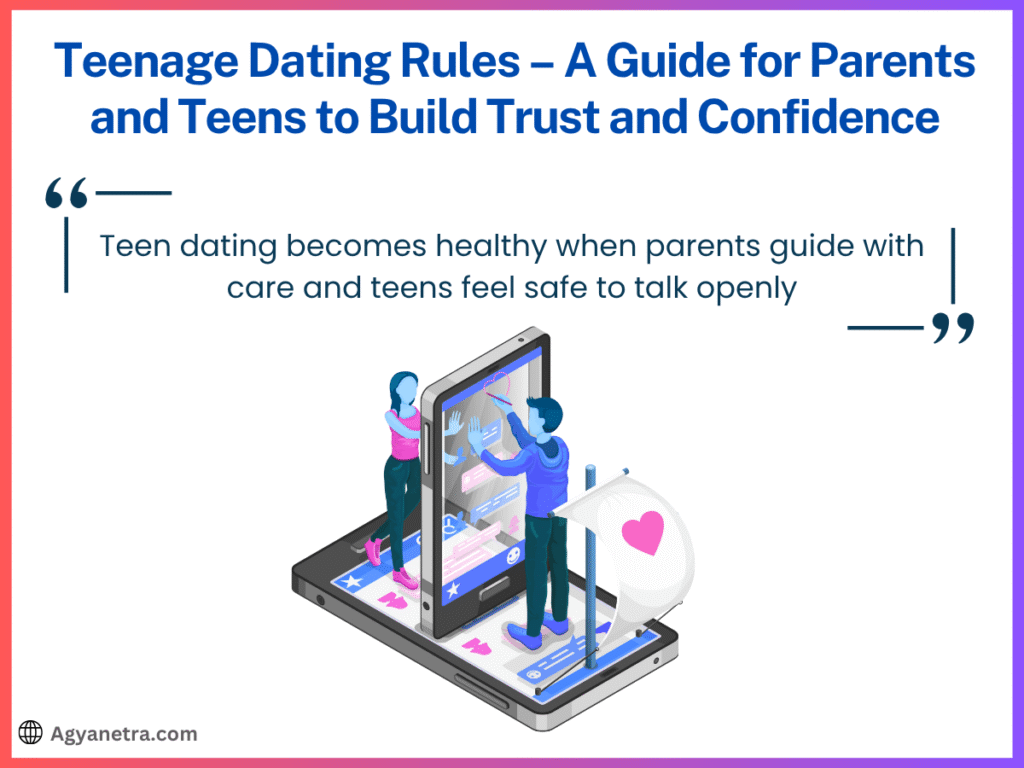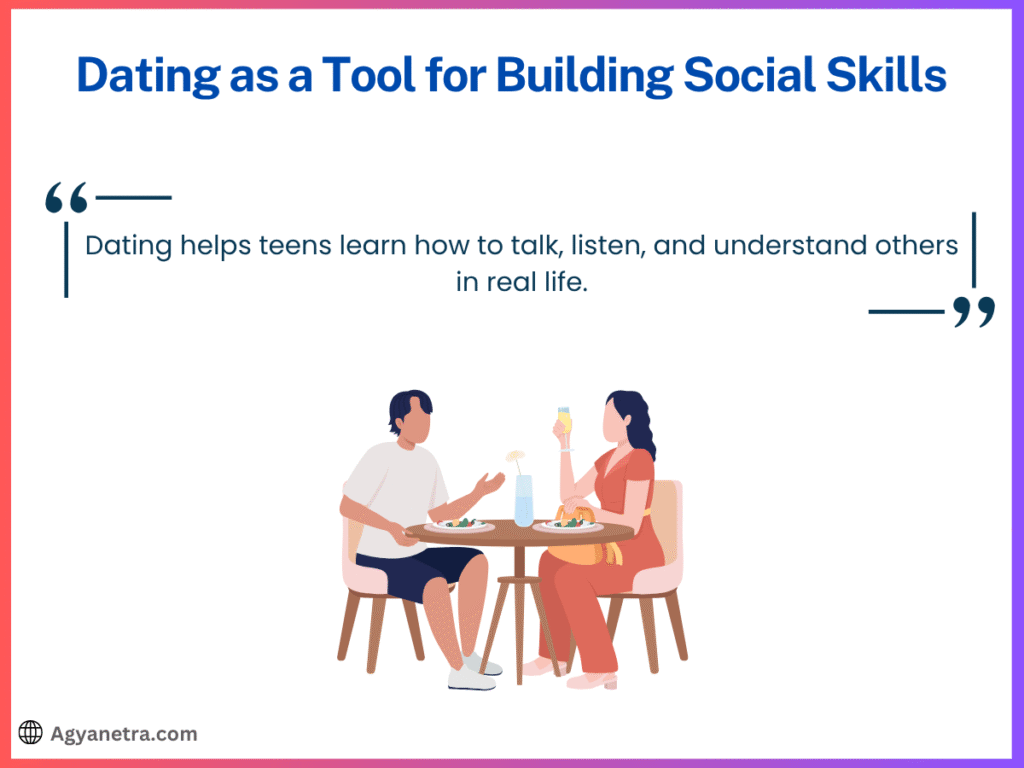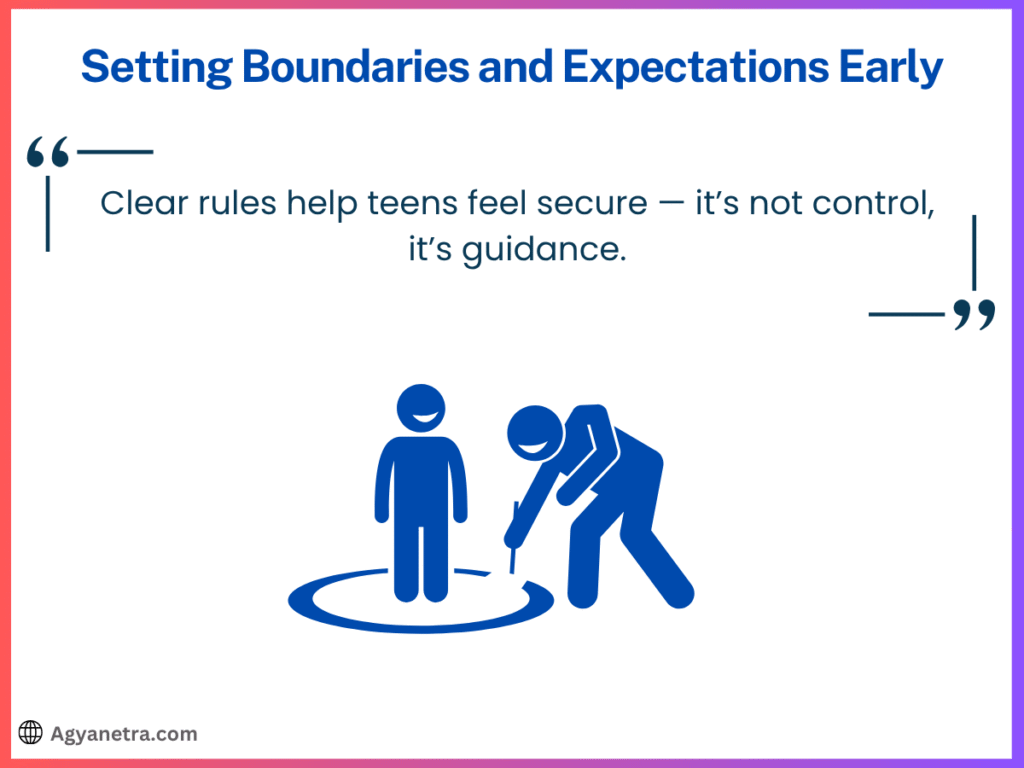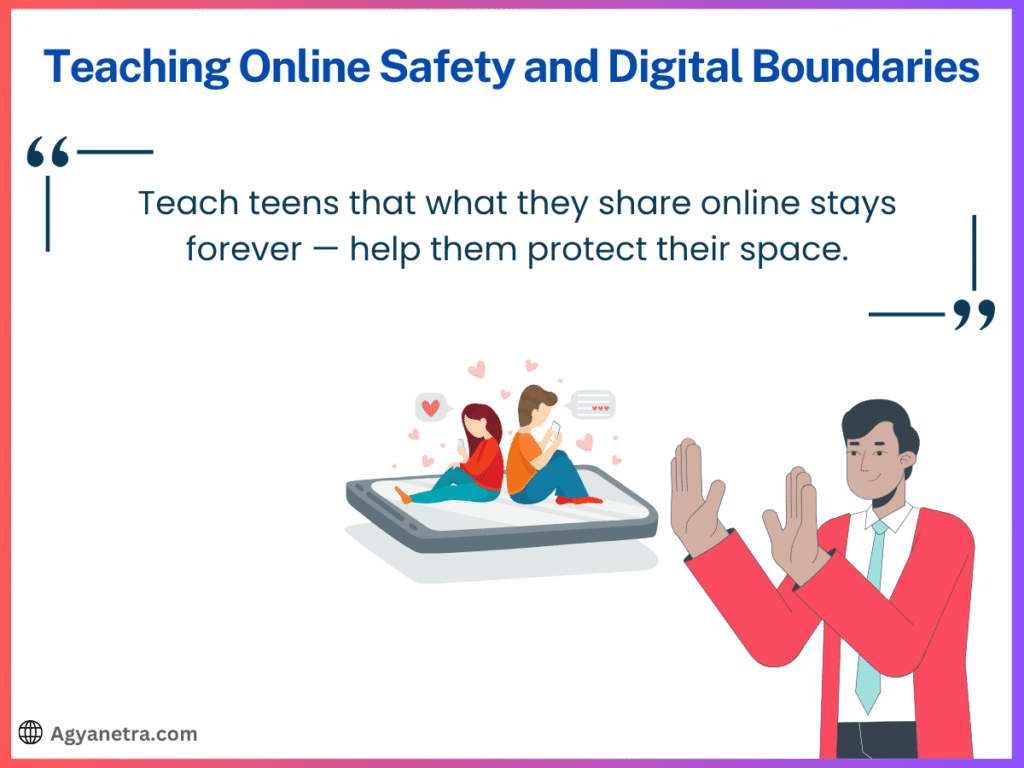Teenage Dating Rules can feel tricky for both parents and teens, especially in today’s fast-changing world. When should teens start dating?
What rules actually help—and which ones push them away? If you’ve ever wondered how to guide your teen through dating without creating conflict, you’re in the right place.
In this article, you’ll discover clear, simple teenage dating rules that focus on safety, respect, and trust.
Whether you’re a parent looking for the right balance or a teen trying to understand healthy boundaries, keep reading—you’ll find real-life examples, helpful tips, and insights that make the dating journey smoother for everyone involved.
Teenage Dating Rules – A Guide for Parents and Teens to Build Trust and Confidence
The teenage years are full of change, emotions, and discovery. Among the many experiences teens go through, dating is one of the most significant and sensitive.

For many parents, it brings up questions: When is the right time to allow it? How much freedom is too much? How do we guide without controlling?
Teenage dating doesn’t have to be a fearful or rebellious phase. With good communication, clear rules, and shared values, it can become a meaningful time for teens to grow, understand themselves, and learn how to build respectful relationships.
This article offers practical teenage dating rules that help parents guide their teens with care, while also giving teens the space to learn and make responsible choices.
Let’s explore each principle to understand how teenage dating can be approached wisely and safely.
Establishing the Right Age for Dating
One of the first and most common questions is about when teenagers should start dating. There’s no single answer that fits every family, but discussing and deciding together creates clarity and reduces confusion.
According to the American Academy of Pediatrics, age 16 is often considered appropriate for beginning one-on-one dating.
By this age, most teens have reached a certain level of emotional and social maturity. However, families should also consider their own values, traditions, and how mature their child is individually.
For example, some teens might show responsibility and emotional control earlier than others. A teen who communicates well, follows household rules, and balances school and social life might be ready sooner than one who is still developing in these areas.
Having this conversation early builds understanding, sets expectations, and reduces peer pressure. When parents and teens agree on a dating age that fits both maturity and family values, trust grows naturally.
Dating as a Tool for Building Social Skills
Teen dating should not only be seen as a romantic experience. It’s also an important way for young people to develop social and emotional skills that they will carry into adulthood.

When teens go on dates—whether casual outings, group events, or one-on-one—they are learning how to:
- Communicate clearly
- Show empathy
- Respect personal boundaries
- Listen actively and understand different perspectives
For instance, a simple coffee outing with a friend or attending a school dance gives teens the chance to practice face-to-face interaction.
They learn to read body language, express their thoughts clearly, and navigate different personalities—all of which help in developing emotional maturity.
Encouraging teens to reflect on their dating experiences is just as important. Ask questions like, “Did you enjoy spending time with them?” or “Did you feel respected and comfortable?” These reflections help build self-awareness and emotional intelligence.
More posts like this:
- Safe Dating Advice for Teenage Girls
- How to Set Boundaries in a Relationship Without Being Controlling
- What Are Red Flags in a Relationship?
- How to Build Strong Family Connections
Setting Boundaries and Expectations Early
Clear boundaries help make dating safe and healthy for teens. These rules are not about control—they are about helping teens make better decisions and stay within the values of the family.

Important areas to cover include:
- Curfews: What time should the date end?
- Type of dates: Are one-on-one dates allowed or should it start with group outings?
- Acceptable locations: Where can they go on dates?
- Physical boundaries: What level of closeness is respectful and appropriate?
For example, a parent might say, “We’re okay with you going to the movies in a group, but let’s wait before starting one-on-one dates.” This approach gives space while still providing a safe structure.
These conversations should happen before dating starts, not during or after. When teens understand the reasons behind rules, they are more likely to follow them.
A collaborative approach also makes them feel included and respected.
Encouraging Group Dating and Supervised Interactions
In the beginning, group dating is a safe and smart option. It allows teens to spend time with others in a fun, social setting without the intensity or pressure of being alone with someone.
Some great examples of group dates include:
- Going to a school event with friends
- Hanging out at the mall or coffee shop
- Watching a movie or sports game as a group
Group settings help teens learn how to socialize, share experiences, and handle group dynamics. It’s also easier for them to spot respectful or disrespectful behavior when others are around.
Supervised social interactions are also helpful. Family get-togethers, birthday parties, or community events offer a setting where parents can observe how teens interact, without interfering.
It also builds trust because parents stay involved in a supportive—not intrusive—way.
Teaching Online Safety and Digital Boundaries
Digital dating and online communication are now a big part of teen relationships. Texting, social media, and online chats can help teens connect, but they also come with risks.

Parents should talk with teens about:
- The importance of privacy settings
- Not sharing personal details or photos
- How to recognize and handle inappropriate messages
- The permanence of digital content
For example, a teen may not understand that a picture sent in private can still be shared publicly.
A simple reminder like, “If you wouldn’t want your teacher or grandma to see it, don’t send it,” can help teens think before they act.
Being aware of the apps your teen is using also makes a difference. Ask questions like, “What do you like about this app?” or “How do you stay safe when chatting with someone online?”
Ongoing conversations help teens stay alert and make smart choices while using technology in their relationships.
The Power of Open and Honest Communication
Strong relationships between parents and teens are built on open, honest, and ongoing communication. This is especially important during the dating years.
When teens feel like they can talk without being judged or punished, they are more likely to share their thoughts, concerns, and experiences. That openness builds trust and helps parents offer better support.
To keep communication flowing:
- Ask open-ended questions: “How did the evening go?” instead of “Did anything bad happen?”
- Listen with full attention
- Avoid jumping to conclusions or giving lectures
It’s also important for parents to model healthy relationship behavior. Teens observe how adults treat each other. Kindness, respect, and good communication at home set the best example.
Helping Teens Reflect and Build Self-Respect
Dating offers teens a mirror to learn more about who they are, what they value, and what they need in relationships. Encourage your teen to reflect after each interaction.
Ask questions like:
- Did you feel comfortable and respected?
- Was it easy to talk to them?
- Did you enjoy yourself, or feel pressured?
These reflections help teens understand that dating is not just about being liked, but about finding mutual respect and emotional safety.
Teach your teen that it’s okay if a relationship doesn’t work out. Not every connection will last—and that’s normal. What matters most is being honest, respectful, and kind throughout the process.
Recognizing Healthy and Unhealthy Behavior
Many teens are unsure about what a healthy relationship looks like. Parents can help by pointing out both the good and the not-so-good signs to watch for.
Signs of a healthy relationship include:
- Respect for each other’s space and opinions
- Support during hard times
- Kindness and patience
- Honest communication
Signs of a toxic or unhealthy relationship might include:
- Controlling behavior
- Jealousy or manipulation
- Pressure to do things they’re not comfortable with
- Lack of trust or constant arguing
If a teen sees these signs but isn’t sure what to do, remind them they can always talk to a trusted adult. Just knowing someone is there for them can make a big difference.
Final words: Teen Dating Is a Learning Process, Not a Problem
Teen dating is not something to be feared or avoided. It’s a phase of learning, self-discovery, and growth.
When approached with clarity, patience, and open dialogue, it helps teens become emotionally aware and respectful partners in the future.
Parents play a guiding role—not by imposing control—but by mentoring their teens with love, honesty, and support.
With the right teenage dating rules in place, both parents and teens can feel more confident and connected.
By staying involved, listening, and encouraging responsibility, families can create an environment where dating doesn’t happen in secrecy but in the light of trust, communication, and mutual growth.
Teenage dating rules, when built on respect, values, and guidance, help teens form strong foundations—not just for relationships, but for life. And that’s something both teens and parents can feel proud of.
FAQs
What are some basic teenage dating rules parents should set?
Parents should set clear rules about curfews, appropriate places for dates, group vs. solo outings, and digital boundaries. Involving teens in the conversation helps them understand and respect the rules more.
At what age should teens be allowed to start dating?
Many experts, including the American Academy of Pediatrics, suggest 16 as a good starting age. However, readiness depends on emotional maturity, family values, and open communication between parents and teens.
Why are dating rules important for teenagers?
Teenage dating rules help protect emotional and physical well-being. They provide structure, reduce peer pressure, and encourage responsible decision-making during a sensitive phase of development.
How can parents talk to teens about dating without conflict?
Use open, non-judgmental conversations. Ask questions, listen first, and share your concerns calmly. This builds trust and makes teens more willing to follow dating guidelines.
What are healthy boundaries in teenage relationships?
Healthy boundaries include respecting each other’s space, saying no without guilt, avoiding emotional pressure, and being honest. These habits help teens build respectful and safe relationships.
Is group dating a safer option for teenagers?
Yes, group dating is a great way for teens to explore social dynamics with less pressure. It offers a more relaxed environment and allows parents to feel more secure about their teen’s safety.
What digital dating rules should teens follow?
Teens should avoid sharing personal details or images online, understand the risks of social media, use privacy settings, and report inappropriate behavior. Parents should guide teens to stay safe online.
How do teenage dating rules support emotional growth?
By reflecting on experiences and setting respectful boundaries, teens learn emotional control, self-awareness, and healthy relationship skills—key for long-term personal development.
How can teens know if a relationship is unhealthy?
Warning signs include control, jealousy, constant arguments, emotional pressure, and lack of respect. If your teen feels stressed or scared in the relationship, it’s time to step back and talk to a trusted adult.
Can teenage dating be a positive experience?
Yes, when guided well, teenage dating can help teens learn about respect, communication, and emotional connection. The goal is not to stop dating, but to support healthy choices and personal growth

Vidushi Gupta is a certified spiritual coach, energy healer, and emotional wellness counselor with over 10 years of experience guiding people through spiritual signs, emotional healing, and inner transformation. Her approach is grounded, fear-free, and focused on helping readers understand spiritual experiences with clarity and emotional balance.
With a background as a digital content strategist and published author of nearly ten novels, Vidushi has reached over 20 million readers worldwide through her writing. She is known for explaining complex spiritual ideas in simple, relatable language, making topics like repeating signs, intuitive shifts, and spiritual awakenings easier to understand and trust.
Through her work, she helps people connect everyday life experiences to deeper inner growth—gently, honestly, and without superstition.
Accuracy, Fact-Checking & Expert Oversight: Vidushi Gupta.
